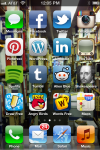Welcome! This is my public/professional space to collect all the materials and ideas that skitter across my path from here to the end of my PhD. It feels strange setting all this up when I’m not looking to market myself for an academic job, almost like I’m jumping the gun, but it seems wiser to get it started now and build it as I go along than to wait until I need it and cobble something together. I confess it makes me both queasy and excited every time I have to set up a new digital stage for my work. Queasy because I have such a long trail of failed/abandoned projects and excited because part of me insists that all those failures were really just learning experiences setting me up to get it right… eventually.
Over the last ten years, I’ve poured a tremendous amount of time and energy into online composition. Sometimes I’ve felt rewarded for the effort and sometimes discouraged. Many (most) of those email accounts, journals, blogs, and photo-sharing sites are abandoned. Every year or two I get manic about knowing all the logins and passwords and drive myself crazy trying to recover posts or pictures, trying to remember who I was when I set up that account. I go spare worrying about the rights to content I’ve made and content I’ve “sampled.”
I’ve used account names that reflect my real name and pseudonyms meant to protect it. Some platforms actively encourage (demand!) one form or the other. I’m not sure how you can know which username you want until you experiment with a new service and understand how you are going to use it. I know there are arguments for complete transparency and complete anonymity, and I know that most people use a mix of both. I’ve found that my online identities seem to fall into four distinct categories: Public, Private, Professional, and Play.
My public accounts are recognized by family and friends and often co-workers and acquaintances (if they are interested in the content). Everything I post is meant to be accessible to anyone who might be interested whether they know me or not.
My private accounts may have no links to people I know in person, or may be recognizable only by a few friends, or may be “friends only” – closed off to anyone I haven’t vetted. The idea of a private account is to have a space to post without fear of reprisal and with some confidence that the “privacy” of the post will prevent hurt feelings and damaged reputations.
My professional accounts are in place for potential employers seeking information. They are, in essence, a public advertisement, and they are meant for people who are looking for me specifically, regardless of my content.
My play accounts are in place to try things out. Perhaps I want to blog every day for a year, but I’m worried about the quality of content that might be generated from such an enterprise. Perhaps I want to create an online comic or vlog, but I don’t quite have the artistic or technical skill to pull it off right away. Play accounts are not necessarily private, but they may not be linked to or acknowledged by your professional or public online identities.
Different platforms may lend themselves to one use or another, but many of them can be tweaked, and all of them can be used as play accounts. Facebook, Twitter, LiveJournal, and Dreamwidth can be made more or less private depending on the settings. (Here I am talking of general privacy and not whether any of them are relaying your info to advertisers or businesses for the purpose of profit.) LinkedIn markets itself as a professional account community. Pinterest is entirely public, as far as I can tell. You might be able to obscure your name, but you can’t hide your content. It would defeat the purpose of the site.
So what is all this mess, then? It turns out that navigating identity online may be as complex as it is in-person. Perhaps even a bit more complex since I’m not sure we are all clear on the terms of engagement. How do you decide who gets to see your content? How do you decide what content to put up? How do you respond if someone misinterprets your content? It happens all the time, and right now, we are learning to deal with it “on the job” as it were. Are there ways to teach internet safety and ethics that go beyond admonitions not to reveal on twitter that you are away from home for two weeks? How do you get to know the “who” behind the “what” that you are reading? I think learning to curate our digital lives is going to become increasingly important as we move more and more of our lived experience into online spaces. I use such spaces daily to reinforce and maintain the connections I’ve made in person and to build connections based on shared interests and concerns with people I may never encounter in person. We can expect the platforms to continue to evolve, and I suspect we may always be just that little bit behind them in anticipating the rhetorical difficulties (and novelties) of social media, but it is critical that we get people to “join the conversation” about what it means to have a life online.
ETA: relevant recent post on io9
